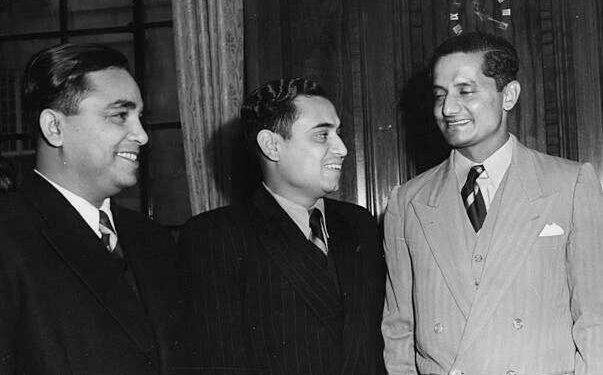Mahomedali Currim Chagla (English: Mahomedali Currim Chagla, born- 30 September, 1900; died- 9 February, 1981) was a famous Indian judge, diplomat and cabinet minister, who served as the Chief Justice of the Bombay High Court from 1948 to 1958. of.
While serving as Education Minister under Jawaharlal Nehru, M. C. Chagla was deeply concerned about the quality of education in government schools. He said – “The intention of the makers of our Constitution was not that we should just erect huts, fill them with children, give them untrained teachers, give them torn books, have no playground and then say that we have adopted Article 45. have been followed and primary education is expanding.” M. C. Chagla desired that real education should be given to children between the age of 6 to 14 years. Unfortunately, his comments remain equally true for Indian education even today.
Born on September 30, 1900 in Bombay (present day Mumbai), M.C. Chagla belonged to a Gujarati Shia Muslim family. The financial condition of his family was very good. After studying at Lincoln College London, he started practice in the Bombay High Court. During this time, he worked with renowned lawyers like Sir Jamshed Ji Kanga and Mohammad Ali Jinnah. Initially he also worked with Jinnah for Muslim League but later when Jinnah demanded a separate country, he changed his ways. MC Chagla was so angry with this move of Jinnah that he founded ‘Bombay Muslim Nationalist Party’.[1]
M. C. Chagla became a professor at the Government Law College, Bombay and worked with Bhimrao Ambedkar here. In 1941, he was made a judge in the Bombay High Court and later served as the Chief Justice here from 1948 to 1958. Jawaharlal Nehru had handed over the reins of the post of Education Minister of the country to him. Nehru ji was criticized a lot at that time but M.C. Chagla proved that he was the most eligible candidate for this post.
When Lal Bahadur Shastri, who was a minister in Jawaharlal Nehru’s cabinet, became the Prime Minister of the country, he handed over the education ministry to former jurist M.C. Chagla. M. C. Chagla was an Indian leader belonging to a Gujarati Shia Muslim family. Before entering politics, he was also the Chief Justice of Bombay High Court. Before Shastriji, Jawaharlal Nehru had also entrusted him with the responsibility of the country’s education ministry.
This was the period when India’s relations with Pakistan were in very bad condition. The opposition was also attacking Congress. Socialist leaders were registering their protest regarding the name of Banaras Hindu University in Varanasi. He said that the word Hindu should be removed from the name of BHU and its old name should be changed to Kashi University. Amidst such conditions, the new Education Minister M.C. Chagla introduced a bill to create a new university. This university was – Jawaharlal Nehru University i.e. today’s ‘JNU’.[1]
At that time, India’s education ministry was not as strong as it was in later times, because most universities were under the states. The ministry had only advisory powers. In many states the salaries of teachers were very low. The Education Minister paid comprehensive attention to the condition of the country’s teachers. It is said that at that time, after hearing about the salaries of teachers, M.C. Chagla had taunted, “If we pay such low salaries to teachers, then how much salary do we pay to peons.” Chagla also talked to the country’s Prime Minister Lal Bahadur Shastri regarding this. He advised the PM that if we can impose ‘pay commission’ for civil servants then why not for teachers? Chagla had told the PM that the work of teachers is in no way less than that of civil servants.
M. C. Chagla tried to bring practical reforms regarding education across the country. In this sequence, he believed that there should be a second university (apart from Delhi University) in the country’s capital Delhi also. His idea was to establish a university with global thinking and excellence. Through this university, the burden of students on old universities could also be reduced. After a long debate, finally after brainstorming in the Education Commission, the decision to start a new university was confirmed. However, the idea of opening a new university in a poor country like India was not easy at that time.
M.C. Chagla accepted this challenge. He solved every problem that arose regarding the idea of JNU and tried his best so that this university could serve the country in its own form. MC Chagla had presented a bill regarding this university in the Rajya Sabha in August 1965. Next month, this bill was also introduced in the Lok Sabha by Minister of State for Education Bhakta Darshan. At that time socialist leaders had raised many questions regarding this university. Although the construction of the university could not be started during his time, M.C. Chagla was among those who envisioned making Jawaharlal Nehru University a university.[1]
On February 9, 1981, M. C. Chagla died of a heart attack. He had been unwell for many years and had suffered a heart attack four years earlier. Due to his active and energetic nature, he did not let his health slow him down. On the day of his death he went to his club in Bombay as usual and had a good time with his friends. After this he quietly went to the dressing room and died peacefully there. In accordance with his wishes, he was cremated rather than given a traditional Muslim burial. The Bombay High Court was closed in his honour, and several condolence messages were delivered in his memory, including a message from future Prime Minister Atal Bihari Vajpayee.






